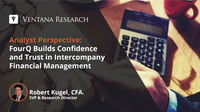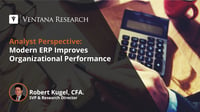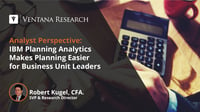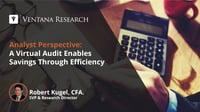FourQ is an intercompany financial management (IFM) Solution-as-a-Service provider. IFM is a discipline for structuring and handling transactions within a corporation and between its legal entities, and is designed to maximize staff efficiency and accounting accuracy while optimizing tax exposure, minimizing tax leakage and ensuring consistent tax and regulatory compliance. Today, IFM is an obscure topic, but I assert that by 2025, one-half of organizations with 10,000 or more employees will...
Read More
Topics:
Office of Finance,
Financial Performance Management,
ERP and Continuous Accounting,
Revenue,
robotic finance,
lease and tax accounting
The ERP system is at the core of nearly every organization’s record keeping and business process management. Its smooth and uninterrupted functioning is essential to an organization’s accounting and finance functions. In manufacturing and distribution, ERP manages inventory and logistics. Some organizations use it to handle human resources functions like tracking workers, payroll and related costs.
Read More
Topics:
Office of Finance,
Financial Performance Management,
ERP and Continuous Accounting,
robotic finance
IBM Planning Analytics, formerly known as TM1, is a comprehensive planning and analytics application designed to integrate and streamline an organization’s planning processes. It can support multiple planning use cases on a single platform, including financial, headcount, sales and demand planning. The software automates enterprise-wide data collection to make it repeatable and scalable across multiple users and departments. It supports sophisticated driver-based modeling that enables rapid...
Read More
Topics:
Office of Finance,
embedded analytics,
Analytics,
Business Intelligence,
Collaboration,
Business Planning,
ERP and Continuous Accounting,
Predictive Planning,
AI & Machine Learning
Organizations have long sought ways to achieve a fast but “clean” (accurate) financial close. The most widely accepted benchmark is to be able to close within one business week. Organizations that close within a business week are almost always more competent in how they manage the process and therefore use resources more efficiently. Also, organizations that close their books within six days after the end of the quarter are more likely to provide executives with timely information and respond...
Read More
Topics:
Office of Finance,
Business Planning,
ERP and Continuous Accounting,
robotic finance
The challenges of the pandemic prevented auditors from visiting client offices, which led to widespread adoption of remote audit processes. Although there are outward similarities between a remote audit and a virtual audit, they aren’t the same. A remote audit uses technology to adapt the existing audit processes to an environment where in-person interactions are impossible. A virtual audit uses technology to redefine and streamline how auditors conduct an annual audit.
Read More
Topics:
Office of Finance,
Financial Performance Management,
ERP and Continuous Accounting,
digital finance
Irked by the need to account for every penny of his college expenses, poet Robert Frost penned the lines:
Read More
Topics:
Office of Finance,
Financial Performance Management,
ERP and Continuous Accounting,
digital finance
















